Uncle Vanya
Anton Chekhov
Adapted by Conor McPherson
Berkeley Repertory Theatre, in Co-Production with Shakespeare Theatre Company
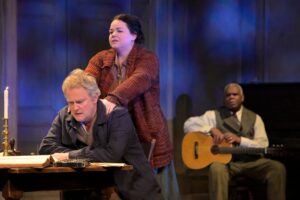
In a co-production with Washington, D.C.’s Shakespeare Theatre Company, Berkeley Repertory Theatre opens a stunning, star-rich, spectacularly directed Uncle Vanya bursting with dark humor and laugh-out-loud wit, brimming with long-held frustrations and regrets, and seething with both lust and rage ready to explode. Conor McPherson’s 2020 adaptation of the classic emphasizes the timelessness of Chekhov’s story and themes while also providing its own fresh takes and modern feel on a play that premiered over 125 years ago.
In rural 1900 Russia, seasons of the year are all that change for a group whose lives are otherwise in a state of perpetual stasis. While emotional outbursts explode on a regular basis within and between this estate’s inhabitants and its visitors, not much, if anything, really results that leads to new resolutions or undertakings. For a group of people who each declare at some point deep unhappiness and disappointment with life, there are strong magnetic forces pulling them right back into the routines of their past, uneventful lives. A moment’s excitement is noticed and then put aside. Words pour out freely; actions follow only reluctantly or awkwardly, if ever. Accepting ownership for one’s life path is just too difficult. Putting the blame for one’s sad state on others or on Fate is so much easier and even attractive.
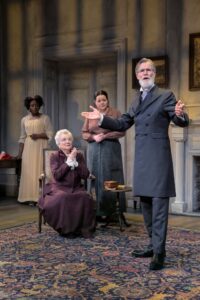
Iván Voinítsky, known to all as Vanya, manages the now run-down country estate of his deceased sister’s husband, a professor of the arts. Vanya lives there along with his niece (Sonyà), his elderly mother (Maríya), an old nurse (Marína, or Nana), and a poor landowner who is now a dependent of the estate (Ílya known as “Waffles”). Their predictable life of breakfast at 8 and dinner at 12 has been totally disrupted by the arrival of the retired professor, Aleksándr Serébryakov, and his new wife — a much younger, extremely attractive, and fashionably sophisticated Yelena.
A local doctor, Mikhaíl Ástrov, arrives to check on the ailing professor, only to be caught up, along with Vanya, in total infatuation with the young and seemingly bored Yelena. She in turn welcomes in coquettish glances the flirtations but offers much verbal protestation, claiming mostly disinterest. In the meantime, a rather plain and shy Sonyá falls head over heals for the handsome doctor, who does not notice her at all.
Tensions rise and fall all hours of day and night as work on the estate comes to a halt due to a contagion of unfulfilled love-sickness and to a general atmosphere of ennui with life by all. “Everything’s the same as before, only worse,” Vanya opines.
When the professor suddenly announces that he has decided to sell his dead wife’s estate (now technically by will, his daughter’s) to buy him and his new wife a home in Finland, mounting resentments of Vanya toward his brother-in-law come to a head involving what has come to be known ‘one of Chekhov’s two guns’ (the other being in The Seagull). Much happens quickly with nothing really changing. In the end, life goes on as the estate begins to prepare for the next season’s coming.
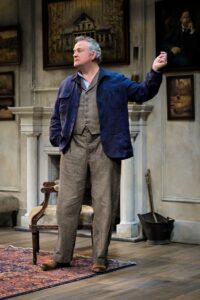
We first meet our title character as he suddenly emerges — full of grouch and grump in his zip-downed pants and sweat-stained shirt– from a nap where he was lying under a crumpled rug on the floor,. Notting Hill and Downton Abbey starring Hugh Bonneville reigns supreme as a oft-clownish Vanya who hilariously retains his pronounced British accent even in this tale of old Russia.
Quick to give a snide retort to any hint of a positive observation (hissing “Perfect weather to slit your wrists” to Yelena’s comment about the nice day outside), his Vanya flips constantly in mood like a sizzling Russian kolbasa from mad to sad and back to mad. He particularly goes ballistic when talking about the professor, whose scholarship he has somehow lost all respect, leaving Vanya disillusioned since he had worshipped him for so many years (“to think I’ve wasted my life for that”). Prone to pitch a fit knocking over chairs or to suddenly fall to the floor in a moment of boredom, Vanya is a roller coaster of loud and dramatic emotions, few resembling anything near joyous. The best he gets in mood is his awkward, humorously over-wrought wooing of a totally uninterested, but somewhat amused Yelena, telling her, “You are the only thing that makes me happy.”
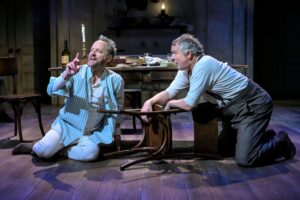
Vanya is momentarily boisterous and full of boyhood energy and prank when he and the visiting doctor, Ástrov, have tipped the vodka glass more than a few times, their even tumbling together on the floor at midnight, caring little whom they might wake. John Benjamin Hickey is superb as the strikingly handsome Ástrov who often shares Vanya’s dire look on life in the country. He bemoans to Nana that “I never feel anything any more, never look forward to anything” and tells a silently besmitten Sonyà, “I don’t love people … I love no one.”
If people and even his patients mostly disinterest the doctor, Ástrov does share Chekhov’s deep passion for environmental concerns, with Hickey’s country doctor becoming a veritable firebrand as he preaches passionately about diminishing forests, disappearing species, and dried-up lakes. While Chekhov’s characters are stuck and often unable to change even when unhappy, it is clear that the playwright and the doctor know even in 1900 that there are detrimental changes that they and all humankind are effecting on future generations during their short, pitiful times on earth.
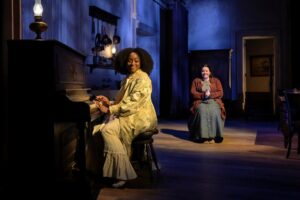
When Yelena walks in the room, Ástrov does take off his sour disposition and becomes much more Casanova in nature. As Yelena, Ito Aghayere walks into a room to be noticed, and she always is. Decades younger than her gout-ailing husband, she shows him both caring and contempt, babying him one moment and bemoaning in another her fate in life for being once taken in by his scholarship (“I hate myself”). Facing the audience while pacing the entire stage in a frenzied outpouring, Yelena spills her reactions to the people with whom she finds herself imprisoned, concluding, “Maybe I should fly away from all these sleepy faces.”
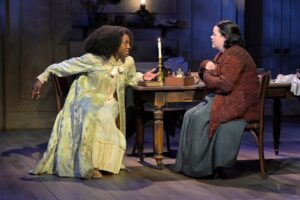
But with Sonyà, she finds a surprising soul-mate, the two being about as different in every physical, fashion, and personality respect as possible (enhanced immensely by the inspired casting decisions of Danica Rodriguez and Karina Fox). When the two share in giggles and squeals their views of the doctor, they are much like two teenage girls at a sleepover outdoing each other with their secret desires. Together, Yelana and Sonyá forge a female bond stronger than any of the males around them could ever attain,
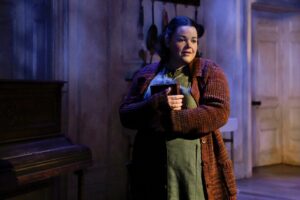
There are times when Melanie Field’s Sonyá seems to be the only adult in the room, especially when admonishing her beloved Uncle Vanya or her favored doctor for some fault she wants either to correct (often connected to drinking). At other times, she is clearly at a young-enough age where passions can mount to the point of causing every muscle to tense, to stimulate eyes to explode in full wonder, and to cause movements to be over-executed out of sheer enthusiasm. At one point, when she hears that Astrov certainly has no love interest in her, Sonya stands statuesque as much else goes on around her, totally exuding hurt, shame, loss, and remorse without moving a inch or uttering a sound.
The rest of this cast measures up with aplomb to the standards set by the leads. Sharon Lockwood is Maríya, mother of the professor’s first wife and also like a mother to all the rest. She is both adored and a source of much annoyance for Vanya as she readily admonishes him for making nothing of his life while showing nothing but admiration for the professor and his supposed brilliance (maybe just to annoy Vanya more).
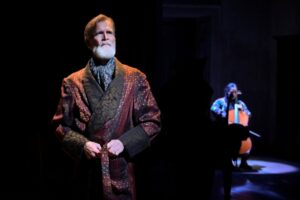
As the retired professor, Alexandré, Tom Nelis is abundantly aristocratic and superior in nature, a man still looking in vain for the idea that he can express in writing that will give him the potential to be remembered once he soon passes. When confronted by Vanya’s disappointment of him, he loses his usual noble composure, rising in shouted anger and disgust. Sick and dying, he too is full of regrets about his life.
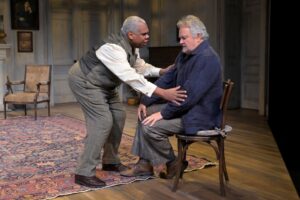
Nancy Robinette’s Nana is a grandmother type who exudes spunk and spark but also is just begging to be hugged for her expressed charm, wisdom of age, and caring for those around her. Equally likable and overall — like Nana — happy with his present lot in life amongst who are not is the pock-faced “Waffles,” a bent-over man immensely prideful while also eager to please, quick to complement, and not shy once in a while to demand to be noticed.
Even before the two-hour, thirty-minute (with intermission) evening has begun, Simon Godwin makes striking directorial decisions, with actors arriving by bike and foot to ascend the stage, leaving outside shoes at the edge and immediately both socializing with each other (and occasionally with someone in the audience) while putting finishing touches on the set and on themselves. These are people much like ourselves who transform before our eyes into characters made epic over the decades through thousands of likened Vanya, globe-wide productions.
Once action starts, the entire evening almost feels like it flies by in half the actual time (often unusual for a Chekhov play), so well does the director manage and vary pacing, emotional swings both pensive and explosive, and character confessions to each other and made directly to the audience.
The opening set designed by Robert Brill combined with costume choices by Susan Hilferty and Heather C. Freedman denote a humble, sparse, and almost shabby existence in the country side of Russia (in much contrast to the visiting professor and his wife). Later scenes transform into rooms and the dress of their inhabitants much more elegant and proper. Jen Schriever bathes the rooms in rooms in dusty shades of shadow-splashed light while also shining brightened spots on drunken rolls on the floor or isolating a character’s lone and intimate interaction with the audience.
The sounds of nighttime crickets and storms or of a nearby forests birds come alive through Darron L. West’s sound design. Scene shifts and moods of climatic points are given beautiful emotional tugs through the live cello playing of ensemble member, Kina Kantor.
With characters that perform a kind of dance between approach and avoidance using language both poetic and current and with a surprising, 21st Century message of man’s destructive effects on the natural world, Berkeley Repertory Theatre’s co-production with Shakespeare Theatre Company’s Uncle Vanya is anything but just a classic of the past pulled off the shelf for one more dusting. Instead Conor McPherson’s adaptation as directed by Simon Godwin is a classic play with a modernity tone and message and truly a must-see for Bay Area audiences.
Rating: 5 E, MUST-SEE
A Theatre Eddys Must See Production
Uncle Vanya continues through March 23, 2025, in a two-hour, thirty-minute (with intermission) production at Berkeley Repertory Theatre (in Co-Production with Shakespeare Theatre Company) at Peet’s Theatre, 2025 Addison Street, Berkeley, CA. Tickets are available online at https://www.berkeleyrep.org/ or by calling the Box Office Tuesday – Sunday, noon – 7 p.m. at 510-647-2949.
Photo Credits: Kevin Berne

Leave a Reply